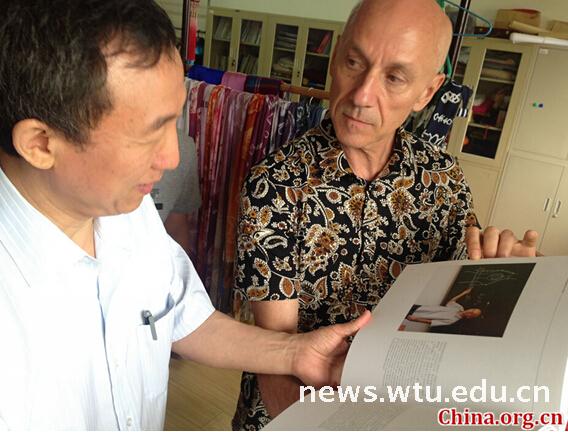When Professor Victor Kuzmichev arrived at Wuhan Textile University (WTU) in 2002, the school offered only beginning-level fashion and textile degrees. In 2007, seven students made up the first higher-level program. Today, there are almost 100 master's students and doctoral candidates.
Kuzmichev, born and raised in Russia, began teaching at WTU in 2002, and was tasked with creating higher education programs at the school. In his 13 years there, the program has grown tremendously, not just in size but in scope.
He has combined art, technology and science to expand pattern blocking so as to accommodate more sizes and body shapes through human-friendly Computer Aided Design, and has strengthened ties between Russian and Chinese textile universities, as well as other universities in Europe.
"It is a great achievement for me to open this [level of] education," Kuzmichev said.
President Xi Jinping honored Kuzmichev recently for his many years of service as a foreign expert in China as part of the "1,000 Talents Plan."

Professor Kuzmichev (R) shows the picture album he received from Chinese President Xi Jinping early May in Moscow to Shang Gang (L), party chief of WTU.
[Photo by Liu Qiang / China.org.cn]
Aside from teaching, Kuzmichev serves as a judge for China Fashion Week twice a year, and has done so since 2005.
"I can describe in my opinion very exactly, in detail, all things that happen in China fashion because I remember the first fashion week and I know the China Fashion Week now," he said.
In building connections with other textile universities, Kuzmichev is especially attuned to the relationship between Russia and China. He said he tries to teach Russian design to Chinese students, and writes articles after every China Fashion Week that are published in Russian and international journals.
He says his life belongs to both countries, and spends time in both every year. This year, he will be in China for six months. The time at home in Russia allows him a chance to refresh his mind.
Along both sides of the border, Russian and Chinese ethnic costumes are very similar, he says; as you get further away, the differences become stronger.
Two main qualities persist in both styles, though: an attention to detail and modesty. Both styles recognize the importance and special meaning of decorative elements, and both try to hide the body instead of showing it off, Kuzmichev says.
"It is not important to show all parts of your body to others," he said of Russian and Chinese dress. "Costume is the mirror of the human mind; costume reflects the human mind as well as the body."
He compares this to a more modest culture altogether in Russia and China: in neither place will you find nude sculptures or a history of body-altering costumes, like corsets.
There are differences though, especially in modern style. Russians are prone to a more uniform look, for example jeans and a plain black shirt, whereas the Chinese, especially Chinese youth, seek more individual outfits.
Speaking more on street style, Kuzmichev says he is amazed at how quickly trends travel. He will see a fashion show in Paris, and only a month later he'll see the same pattern in a local Chinese market.
Earlier this week, party chief of WTU Shang Gang thanked Kuzmichev for his hard work and dedication to the university, as well as for opening the gateway to combining art, technology and science.
"He is known for his meticulous scholarship," Lang said. "He has taught us a lot about how to study the human body."
Kuzmichev and his master's students are working on the human-friendly CAD in order to allow for fit and feel to be determined even when designing online.
Of working in Wuhan, Kuzmichev said he feels it is his destiny to work and live there, and hopes he has changed other people in positive ways, both in fashion and in science.
媒体链接:http://www.china.org.cn/china/2015-06/05/content_35749232.htm?from=singlemessage&isappinstalled=0